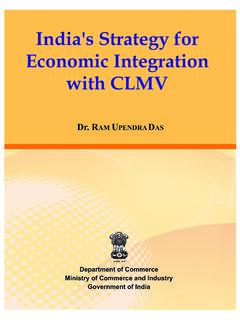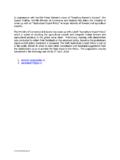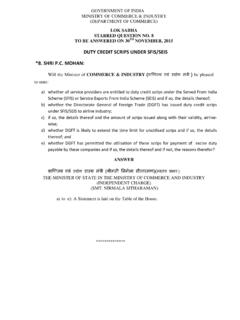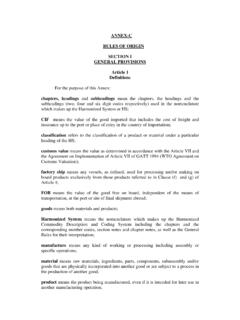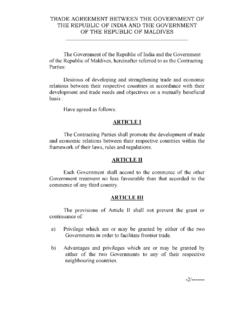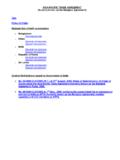Transcription of ASEAN-India Trade in Goods Agreement
1 1 Agreement ON Trade IN Goods UNDER THE FRAMEWORK Agreement ON COMPREHENSIVE ECONOMIC COOPERATION between THE REPUBLIC OF INDIA AND THE ASSOCIATION OF SOUTHEAST ASIAN NATIONS PREAMBLE The Government of the Republic of India (India) and the Governments of Brunei Darussalam, the Kingdom of Cambodia (Cambodia), the Republic of Indonesia (Indonesia), the Lao People s Democratic Republic (Lao PDR), Malaysia, the Union of Myanmar (Myanmar), the Republic of the Philippines (the Philippines), the Republic of Singapore (Singapore), the Kingdom of Thailand (Thailand) and the Socialist Republic of Viet Nam (Viet Nam), Member States of the Association of Southeast Asian Nations (collectively, ASEAN or ASEAN Member States , or individually, ASEAN Member State ), RECALLING the Framework Agreement on Comprehensive Economic Cooperation between the Republic of India and the Association of Southeast Asian Nations, signed by the Heads of Government/State of India and the ASEAN Member States in Bali, Indonesia on 8 October 2003 and the Protocol to Amend the Framework Agreement on Comprehensive Economic Cooperation between the Republic of India and the Association of Southeast Asian Nations, signed in [venue] on [date].
2 RECALLING FURTHER Articles 2 and 4 of the Protocol to Amend the Framework Agreement on Comprehensive Economic Cooperation between the Republic of India and 2the Association of Southeast Asian Nations which reflect the commitment of India and ASEAN to establish the ASEAN-India Free Trade Area covering Trade in Goods by 2013 for Brunei Darussalam, Indonesia, Malaysia, Singapore and Thailand and India; by 2018 for the Philippines and India; and by 2013 for India and by 2018 for Cambodia, Lao PDR, Myanmar and Viet Nam; REITERATING the importance of special and differential treatment to ensure the increasing participation of the new ASEAN Member States in economic integration and cooperation activities between India and ASEAN; REAFFIRMING the Parties commitment to establish the ASEAN-India Free Trade Area while allowing flexibility to Parties to address their sensitive areas as provided in the Framework Agreement ; HAVE AGREED as follows: ARTICLE 1 Definitions For the purposes of this Agreement , the term: (a) AIFTA means the ASEAN-India Free Trade Area under the Framework Agreement on Comprehensive Economic Cooperation between the Republic of India and the Association of Southeast Asian Nations; (b) applied MFN tariff rates shall include in-quota rates, and shall: (i) in the case of ASEAN Member States (which are WTO Members as of 1 July 2007) and India, refer to their respective applied rate as of 1 July 2007, except for products identified as Special Products in the Schedules of Tariff Commitments set out in Annex 1.
3 And 3 (ii) in the case of ASEAN Member States (which are non-WTO Members as of 1 July 2007), refer to the rates as applied to India as of 1 July 2007, except for products identified as Special Products in the Schedules of Tariff Commitments set out in Annex 1; (c) ASEAN means the Association of Southeast Asian Nations which comprises Brunei Darussalam, the Kingdom of Cambodia, the Republic of Indonesia, the Lao PDR, Malaysia, the Union of Myanmar, the Republic of the Philippines, the Republic of Singapore, the Kingdom of Thailand and the Socialist Republic of Viet Nam and whose members are referred to in this Agreement collectively as the ASEAN Member States and individually as an ASEAN Member State; (d) Framework Agreement means the Framework Agreement on Comprehensive Economic Cooperation between the Republic of India and the Association of Southeast Asian Nations, signed in Bali, Indonesia on 8 October 2003, as amended; (e) GATT 1994 means the General Agreement on Tariffs and Trade 1994 in Annex 1A to the WTO Agreement , including its Notes and Supplementary Provisions; (f) Goods means materials and/or products; (g) originating good means a good that qualifies as originating under Article 7; (h) new ASEAN Member States refers to Cambodia, Lao PDR, Myanmar and Viet Nam; (i) Parties means India and ASEAN Member States collectively; 4(j) Party means India or an ASEAN Member State; (k) WTO means the World Trade Organization; and (l) WTO Agreement means the Marrakesh Agreement Establishing the World Trade Organization, done on 15 April 1994.
4 ARTICLE 2 Scope This Agreement shall apply to Trade in Goods and all other matters relating thereto as envisaged in the Framework Agreement . ARTICLE 3 National Treatment on Internal Taxation and Regulations Each Party shall accord national treatment to the Goods of the other Parties in accordance with Article III of GATT 1994, which shall apply, mutatis mutandis, to this Agreement . ARTICLE 4 Tariff Reduction and Elimination 1. Except as otherwise provided for in this Agreement , each Party shall gradually liberalise, where applicable, applied MFN tariff rates on originating Goods of the other Parties in accordance with its schedule of tariff commitments as set out in Annex 1. 2. Nothing in this Agreement shall preclude any Party from unilaterally accelerating the reduction and/or elimination of the applied MFN tariff rates on originating Goods of the other Parties as set out in its tariff reduction/elimination schedule in Annex 1.
5 53. Except otherwise provided in paragraph 1, all commitments undertaken by each Party under this Article shall be applied to all the other Parties. ARTICLE 5 Transparency Article X of GATT 1994 shall be incorporated, mutatis mutandis, into and form an integral part of this Agreement . ARTICLE 6 Administrative Fees and Formalities Each Party reaffirms its commitments under Article of GATT 1994. ARTICLE 7 Rules of Origin The Rules of Origin and Operational Certification Procedures applicable to the Goods covered under this Agreement are set out in Annex 2 and its Appendices. ARTICLE 8 Non-Tariff Measures 1. Each Party shall: (a) not institute or maintain any non-tariff measure on the importation of Goods from the other Parties or on the exportation or sale for export of Goods destined for the territory of the other Parties, except in accordance with its WTO rights and obligations or other provisions in this Agreement ; and (b) ensure the transparency of its non-tariff measures allowed under subparagraph (a) and their full compliance with its obligations under the 6 WTO Agreement with a view to minimising possible distortions to Trade to the maximum extent possible.
6 2. The Parties reaffirm their rights and obligations under the Agreement on Technical Barriers to Trade in Annex 1A to the WTO Agreement and the Agreement on the Application of Sanitary and Phytosanitary Measures in Annex 1A to the WTO Agreement , including notification procedures on the preparation of relevant regulations to reduce their negative effect on Trade as well as to protect human, animal or plant life or health. 3. Each Party shall designate its contact point for the purpose of responding to queries related to this Article. ARTICLE 9 Modification of Concessions 1. The Parties shall not nullify or impair any of the concessions made by them under this Agreement , except as provided in this Agreement . 2. Any Party may, by negotiation and Agreement with any other Party to which it has made a concession, modify or withdraw such concession made under this Agreement .
7 In such negotiations and Agreement , which may include provision for compensatory adjustment with respect to other Goods , the Parties concerned shall maintain a general level of reciprocal and mutually advantageous concessions not less favourable to Trade than that provided in this Agreement prior to such Agreement . ARTICLE 10 Safeguard Measures 1. Each Party, which is a WTO Member, retains its rights and obligations under Article XIX of GATT 1994 and the Agreement on Safeguards in Annex 1A to the WTO 7 Agreement ( Agreement on Safeguards) and Article 5 of the Agreement on Agriculture in Annex 1A to the WTO Agreement ( Agreement on Agriculture). Any action taken pursuant to Article XIX of GATT 1994 and the Agreement on Safeguards or Article 5 of the Agreement on Agriculture shall not be subject to the Agreement on Dispute Settlement Mechanism under the Framework Agreement ( ASEAN-India DSM Agreement ).
8 2. A Party shall have the right to initiate a safeguard measure under this Article (an AIFTA safeguard measure) on a good within the transition period for that good . The transition period for a good shall begin from the date of entry into force of this Agreement and end five (5) years from the date of completion of tariff reduction/elimination for that good . 3. A Party shall be free to take an AIFTA safeguard measure if, as an effect of the obligations incurred by that Party under this Agreement , a good is being imported from the other Parties to which tariff concession was made for that good in such increased quantities, absolute or relative to domestic production, and under such conditions so as to substantially cause or threaten to cause serious injury to the domestic industry of the importing Party that produces like or directly competitive Goods in its territory.
9 4. If an AIFTA safeguard measure is taken, a Party taking such a measure may: (a) suspend the further reduction of any tariff rate under this Agreement for the good ; or (b) increase the tariff rate on the good concerned to a level not to exceed the lesser of: (i) the applied MFN tariff rate on the good in effect at the time the action is taken; or 8(ii) the applied MFN tariff rate on the good in effect on the day immediately preceding the date of entry into force of this Agreement . 5. An AIFTA safeguard measure may be maintained for an initial period of up to three (3) years and may be extended for a period not exceeding one (1) year if it is determined pursuant to the procedures referred to in paragraph 6 that the measure continues to be necessary to prevent or remedy serious injury and to facilitate adjustment and that there is evidence that the domestic industry is adjusting.
10 Notwithstanding the duration of an AIFTA safeguard measure on the good , such a measure shall terminate at the end of the transition period for that good . 6. In applying an AIFTA safeguard measure, the Parties shall adopt and apply, mutatis mutandis, the rules for the application of safeguard measures, including provisional measures, as provided under the Agreement on Safeguards, with the exception of the quantitative restriction measures set out in Articles 5 and 7, and also, Articles 9, 13, and 14 of the Agreement on Safeguards. 7. An AIFTA safeguard measure shall not be applied against a good originating in the territory of a Party so long as its share of imports of the good concerned in the importing Party does not exceed three (3) per cent of the total imports of that good from the other Parties. 8. In seeking compensation under Article 8 of the Agreement on Safeguards for an AIFTA safeguard measure, the Parties concerned shall seek the good offices of the Joint Committee established under Article 17 to determine the substantially equivalent level of concessions to that existing under this Agreement between the Party taking the safeguard measure and the exporting Parties which would be affected by such a measure prior to any suspension of equivalent concessions.

